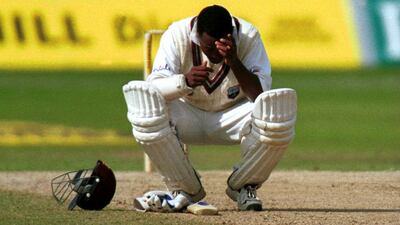The decline had long begun by the time West Indies arrived in Australia at the end of 2000. They had lost all five Tests on a tour of South Africa two years previously and they had also been clean swept by Pakistan at home.
But even then, occasionally, and usually inspired by Brian Lara, or Curtly Ambrose and Courtney Walsh, they could pull off a result that suggested their fortunes could be salvaged, like when they drew with Australia in the Caribbean, or beat Pakistan there.
But it was that tour, 15 years ago now, which they lost 5-0 as well that well and truly confirmed, beyond a shadow of doubt, that the West Indies were in the pits and that they would not rise thereafter. Some last sense, of hope, of resurgence, went in that series
At least in South Africa they could claim the disruption of a pay dispute before the tour.
In Australia they had no such excuse, other than that they were just not a good side. They lost two Tests by an innings and one by 352 runs. It was the sixth away series they had lost in a row and, at one point, had lost 10 of their 11 first-class games.
That was also the last time they were considered good enough opponents to have five Tests in an Australian summer.
To be fair, though, that was the last time any side other than England played a five-Test series in Australia.
There has not been any sustained revival since, just the occasional gasps of air, such as a Champions Trophy triumph, in 2004, or the World Twenty20, in 2012, or a series win against England.
They begin a three-Test series in Australia tomorrow in Brisbane at what would usually be called a low ebb, except that the very idea has lost scale with West Indies.
What is a low ebb for them in the modern age?
Is it when a Caricom review panel says the West Indies Cricket Board (WICB) is “antiquated” and “obsolete”, and calls for the current board to be dissolved immediately and for all members to resign? The board has yet to officially respond.
Never especially flush with finances, they are also burdened by a US$42 million (Dh154.3m) damages claim by the Board of Control for Cricket in India, emanating from their aborted tour of India in October 2014. The pay dispute that preceded the South Africa tour all those years ago was not a one-off, it is now clear, but a template.
Almost every other year, the players and board seem entangled in one.
That has led to West Indies rarely playing their best team, or at least the board alienating several of their best players. Five West Indians, it feels absurd to point out, will be playing in the Big Bash League in Australia at the same time as the series.
Its effects are forever rippling through their game: Phil Simmons, for speaking out about it, was suspended as coach though now has been restored. Dysfunction does not begin to describe it.
It could get gruesome, especially given the run they are currently on, of having lost their past four Tests.
The 10-wicket loss to a fresh Cricket Australia XI, as a warm-up ahead of the first Test, further sours a bitter period.
osamiuddin@thenational.ae
Follow us on Twitter at NatSportUAE

